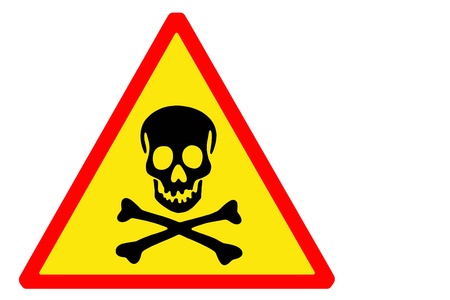
Formaldehyde is commonly used as a industrial disinfectant as well as a preservative in funeral homes and medical labs. In some cases, it is used as a food preservative and can be found in medicines and cosmetics. It can also occur naturally in the environment through animal and human metabolic processes. The chemical is colorless, extremely flammable and has a suffocating odor.
People mainly get exposed to this chemical by inhalation. It can also be absorbed through the skin. Moreover, people can be exposed to it by consuming contaminated foods. Any material containing formaldehyde can release it as vapor or as a gas. Another place where the chemical is found is in tobacco smoke which can affect both the smokers and the secondary inhalers. It can also be found in low concentrations in skin care products and cosmetics.

The group of individuals that are repeatedly exposed to formaldehyde are the workers producing the chemical, lab technicians, and morticians. The chemical is dangerous if it is present in the air at a level more than 0.1 ppm, it can cause adverse effects like coughing, nausea, watery eyes, skin irritation and a burning sensation around the nose and eyes. The short-term effects of formaldehyde are common, but most people are not aware of its long-term health effects. Research has shown that formaldehyde causes cancer. A test was done on rats which proved that it causes nasal cancer in rodents. This study raised the question of whether formaldehyde would have the same effect on humans. Formaldehyde has been classified as a human carcinogen.

The National Cancer Institute conducted research to determine the relationship between occupational exposure to formaldehyde and the various types of cancer. The study was meant to improve occupational safety to the workers. Individuals exposed to formaldehyde are at an increased risk of suffering from leukemia and brain cancer. What will happen if all the funeral workers suffered from brain cancer? Ive met several embalmers that have been diagnosed with brain cancer!
Funeral directors are parents, daughters, sons, husbands, and wives. Their loved ones count on them and want them to stay alive and healthy. So why does the industry put them at risk of getting cancer? If they fall sick or died the bodies would be piling up all over the place and cause a major public health crisis!
Some of the cancer types like hematologic cancer which includes leukemia development in the bone marrow or blood. The other kind is lymphatic which develops in tissues and organs which carry white blood cells. White blood cells take the responsibility of fighting diseases, and the outcomes can never be good if the cells are consumed since the body cannot fight infections. A study showed that morticians exposed to formaldehyde had a lower number of white blood cells than the rest of the study participants.
Inhaling – If a worker inhales above 50 ppm concentration of formaldehyde, it can cause severe pulmonary reactions within a short period. The results include pneumonia, bronchial irritation and pulmonary edema. Low concentrations cause moderate irritations like coughing and wheezing. It can also cause bronchial asthma. Upper airway irritation is very common among funeral directors and can occur even at low concentrations depending on their body reactions. The symptoms of upper airway irritation are a sore throat, burning sensation in the nose and nasal congestion.
Eye contact – The chemical produces a painful sensation and irritation of the eyes with severe redness, itching, burning and tearing.
Skin contact – Absorption of formaldehyde by the skin causes irritation and allergic reactions. The reactions can occur even at low concentrations as human skin is very sensitive. Allergic reactions as a result of formaldehyde absorption can include edema.
The employers’ responsibility – It is the employer’s duty to ensure the safety of the employees is observed while at the workplace. Employers should provide workers with protective gear and proper ventilation. I have embalmed in about ten different funeral homes and not one of them had proper ventilation! There are other products in the market that can be used in funeral homes without posing a threat to the welfare of employees.
The employees’ obligation – It is the employee’s obligation to file complaints with OSHA when they feel like their legal rights and personal health is being neglected. No employee should ever have to agree to work under such dangerous circumstances.
With the damage done by formaldehyde, there is no way funeral directors are going to improve their lives. Many funeral professionals respond emotionally when they are inhibited by the side effects of formaldehyde. Some of the emotional effects are:
- Drug abuse – Due to the dulling effects of formaldehyde, many embalmers naturally turn to alcohol and drugs to stimulate their chronically dulled brains in search of feelings of joy. The chemical thus leads to the use of more damaging chemicals further compounding the de-sensitization of the embalmers. The everyday stress of dealing with sad irritable people is already a driving factor but slightly preserved brains have a harder time just saying no.
- Laziness – We know for a fact that many in funeral service simply do as little as possible and prefer to just do things the way they always have. Could formaldehyde be the cause of the brain fog that blocks motivation and the ability to innovate. We know about premature burnout and that most graduates of the funeral service leave their chosen profession in the first three years. It’s not like they didn’t know what the job entailed, but they soon realize their mental health is rapidly going down the drain along with a mixture of blood and poison. Stress is usually blamed for what could be the effects of breathing poisonous fumes.
- Memory loss – I’ve embalmed about 3,000 bodies and have suffered from chronic C.R.S. I’ve been off the fumes now for about ten years now and can say that my memory is slowly returning with time. In a business where details are everything, anyone would have to admit that it’s hard to plan a funeral in one day with so much to remember. Wedding planners take months to do the same thing. Thankfully we have smart phones, check lists and funeral planning software that helps funeral pros remember all the details as their own capacity can be diminished to a trickle.

It is sad to see that the morticians have to absorb all of the fumes coming from what they believe is the only way to properly preserve the dead. It’s great that they are so dedicated to their life’s work, but should they have to risk their own lives on the deceased? I say the sacrifice is already enough without the risk of contracting cancer. The chemical is highly concentrated and puts them in grave danger.
Harsh steps need to be taken to eliminate this deadly substance from the market. It would be insane if people continue using this stuff even after realizing the dangers associated with it, but that is exactly what is happening. There are many other harmless non-formaldehyde based products for carrying out the same tasks. Why does the funeral industry refuse to change, evolve, and protect the workers and their health?

written by a true person that promotes cremation
Written by an embalmer that has responded to cremation and cares about the health of other embalmers. BTW cremation does not mean no embalming. A well presented/embalmed deceased is one of the most important aspects of funeral service.
As the wife of a funeral director of 30 years I take issue with some of your comments. Anyone who knows anything about the funeral industry also know about that embalmers are required to take utmost precautions when embalming a body as stated by the OSHA training. They are to wear respirator a and other garb to protect themselves. I personally find it offensive that you are using this article to promote cremation over traditional burial under the pretense of concern for funeral director health. The average human being stands a better chance of having the same above issues being exposed to ever day toxins in our environment as funeral directors do to chemicals. As for lazy, these fine men and women work tirelessly day and night to serve families in need and if they are a little slow on their feet some days it may just be because they spent a 10 hour day serving a family and got called out to embalm.
I became a funeral director as a 20-year old girl right out of college. I embalmed 3400 bodies over 18 years with all proper precautions. I ran triathlons and was the epitome of health and got leukemia at age 38. Go screw yourself! Let’s see if you let your daughter do the same. Do dinner googling…You are an idiot if you think it doesn’t cause cancer but baby powder does? Formaldehyde and other harsh chemicals should be banned!
Looking into Class Action suit against chemical companies.
Let me know if my attorney could talk to you.
My uncle did the same thing….ran, biked, ate healthy….never exposed to formaldehyde or any order chemical and died at age 45 from….leukemia.
What other options are there for preserving the body?
Salt
honey
Totally false information. Read the actual research on formaldehyde and embalming and you will find the studies were not done in a professional manner and much of the outcome was tremendously overstated. Read the following for more:
https://ntp.niehs.nih.gov/ntp/results/pubs/rr/reports/rr03_508.pdf
What can a mortician use for his skin ,face look dye from inhaleing fuse for many years.Is there any product out there to restore my skin.
Looking at a Class Action suit.
Need a claim pool for attorney.
Time frame December 2018.
Any embalmer affected.
I have a friend mortician dying from cancer. Did you file a class action? I’m a retired paralegal looking into this matter for him. Please e-mail me back with info. Thanks
Need affected embalmers for Class Action suit December 2018
Racheleve75@gmail.com
I have been an embalmer 22 years and have been affected. Interested in class action lawsuit
The Champion company offers a more natural formula without formaldehyde for funeral embalming.
Lavina Morticia.
As far as a more natural embalming formula, I’ve read up on those, but I wonder if they are more expensive? I really haven’t tried finding prices, as I am a consumer and in my research, don’t remember if I saw price comparisons.
As for myself, I have pre-planned my services even though I don’t know when it will be my time to go.
I chose the same services as my parents, which include embalming, viewing and service and cremation afterwards.
I was surprised to learn that during the embalming process, as the blood is drained and embalming fluid is pumped in, the blood goes down a drain, which, in turn, goes into the Sewer system. Is this true? Does it apply to all U.S. States as far as how the blood is disposed of. The one concern I have is that, invariably, some embalming fluid will find its way into the Sewer system, right?
Are Water treatment plants able to remove any traces of formaldehyde or other biohazards, like the blood itself?
Thank You for reading…
Korey
Can I still join the class action suit?
I’ve a friend who is suffering from severe cough as a result of constantly using formaldehyde for embalming.